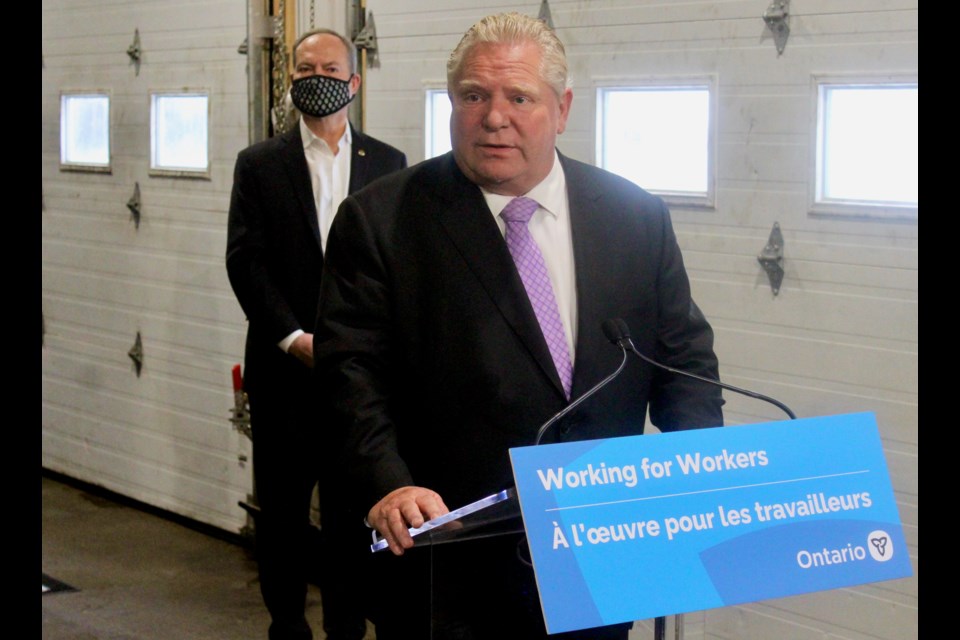A local business served as the backdrop for an announcement Monday about increased funding for job training.
Premier Doug Ford was at Orillia Auto and Truck Recyclers in Oro-Medonte, where he announced the province’s $5-million expansion of the Second Career program and his government’s proposed extension of the Ontario Jobs Training Tax Credit.
With the Second Career program, people can receive up to $28,000 to help pay for their education and living expenses.
“We’re already seeing the early success of this program,” Ford said. “Since March 2021, when the Second Career program was launched, it has helped thousands and thousands of people train for new careers and land new jobs.”
The program is for those who have been laid off and have not been working or who have been laid off and are working a temporary job to cover costs.
As part of its expansion, in spring 2022, Second Career will assist “unemployed individuals with little or no work experience, those who are self-employed and those in the gig economy,” the province stated in a news release.
“The program will also offer much better access for those whose employment barriers may have been made worse by the pandemic, including young people, newcomers, people on social assistance, and people with disabilities.”
There are more than 300,000 unfilled jobs in Ontario, and Ford hopes the latest investment will help address that problem.
“Everywhere I go in the province, people are saying they need to hire people. So, that’s great news,” he said. “This will also continue as we see more businesses and more jobs coming to Ontario to take advantage of our open-for-business attitude and world-class labour force.”
“For us to reach our full potential, we need everyone — no matter where they live, who they are and what their background is — to reach theirs,” added Monte McNaughton, minister of labour, training and skills development.
“We’re helping our workers and businesses recover. We’re making sure no worker is left behind. We’re working for workers.”
Finance Minister Peter Bethlenfalvy referred to the number of unfilled jobs as “one of the biggest challenges our economy faces.
“Each and every one of these jobs represent an opportunity — an opportunity to build a new career, an opportunity to build a better life for yourself, for your family and for your community.”
He noted Ontario has, at 4.5 per cent, the fewest number of workers with apprenticeship or trades credentials. The federal average is 10.5 per cent.
“This presents a real risk to our economic recovery and to our prosperity,” he said.
“If you are prepared to put in the work, time and efforts to learn skills to support your family, our government is prepared to put in the money and give you every opportunity to see it through.”
Ford was asked what the province is doing to support restaurants and others in the hospitality and tourism industries, which are also having trouble filling positions.
“If you’re of healthy mind, healthy body, there’s a job out there in every single sector. So, please, if you’re able, please look for gainful employment,” he said.
Ford said he had asked some restaurant owners if they’d be willing to pay $15 per hour — the province’s minimum wage starting Jan. 1, 2022.
“The majority of them laughed and said, ‘$15? I’ll pay them whatever it takes to get in here because I have my restaurant closed half the amount of time that it was before and we need people,’” he said.
“That’s a beginning wage. It’s tough for anyone to survive on $15. This is an employee’s market. I encourage people to go out there, increase their skills, find other jobs if they want to earn more money because there’s never been a market like this in many years.”
The province is also proposing the extension of the Ontario Jobs Training Tax Credit, a move that would provide approximately $275 million in additional funding to assist about 240,000 people who want to upgrade their skills. The credit can cover up to $2,000 for 50 per cent of someone’s eligible training expenses.
